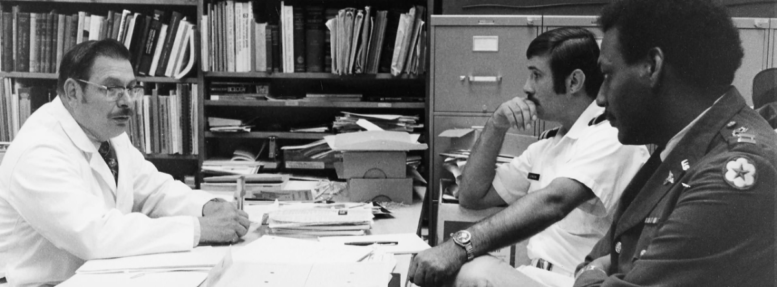From BGSU OFFICE OF MARKETING & COMMUNICATIONS
Dr. William Hann, a longtime BGSU biological sciences professor, had a history of helping others. Before his death in 2009, he taught biology for 25 years, was a dedicated volunteer to numerous local organizations, including the Boy Scouts, served as a military leader for 37 years in the National Guard and U.S. Army Reserve and transformed the military blood bank that has helped save the lives of service members worldwide.
His dedication to the Armed Services Blood Program (ASBP) earned him a Lifetime Achievement Award, which was presented posthumously at the ASBP’s annual meeting in October. His widow, Emma Hann of Bowling Green, accepted the award on his behalf, remarking how much he loved his work at BGSU and with the blood bank program.
Before coming to BGSU to teach in 1967, Hann was a military policeman during the Korean War and then worked at the National Naval Medical Center and the National Institutes of Health. At BGSU, he taught bacteriology, microbiology and virology and was involved in developing the medical technology and blood bank programs at the University.
According to Navy Capt. Roland Fahle, ASBP director, Hann was “a trailblazer” who “opened a door that never closed for many blood bankers.” He was best known for his work with ASBP’s Specialist in Blood Banking Fellowship Program, which trains clinical laboratory officers from all three branches of the Armed Services in the advanced, specialized blood bank topics necessary in the health care industry. Military blood bank fellows were scholastically empowered to propel the military blood banks worldwide into fulfilling their military readiness mission.
As a mentor to hundreds, if not thousands, of biology students, he was known for excellent clinical and pedagogical skills. Four of his former students — Col. (Ret.) Anthony Polk ’74; Dr. W. Patrick Monaghan ’72, ’74, ’75; Col. (Ret.) James Berger ’83, ’85; and Dr. Jerry Holmberg ’84, ’85 — nominated Hann for the lifetime achievement award. They each had successful careers in the military blood bank program and previously earned the ASBP lifetime achievement awards for their own contributions.
“His personal efforts resulted in convincing key members of the U.S. Army and the administration of Bowling Green State University into a formalized relationship in supporting research, training and education,” his nominators stated.
In 1972 during a visit to the U.S. Army Medical Research and Development Command, Hann, who was also a colonel in the U.S. Army Reserves, recognized the possibility of establishing a professional relationship between academia and the training provided by the U.S. Army in the tri-service Blood Bank Fellowship.
Because of the partnership, the University incorporated the military blood bank fellowship training program into the curriculum with attendant credits. Thereafter, military blood bank students could use their hard-earned credits as part of a graduate degree program and go on to obtain their doctorate as well. Hann helped develop stringent course work and intensive training which ensured that the students graduated from the program as true specialists.
For 18 years, fellowship students could apply to the graduate school at the University and receive formal credit toward their graduate degrees. More than 100 officers received graduate credit hours, many of whom earned a master’s degree in applied biology (immunohematology), and five completed their research and earned doctoral degrees.
“Dr. Hann helped so many military students attain their graduate degrees. I remember the many dinner parties he and his wife hosted for all of his students, always keeping the Blood Bank Fellowship program family-oriented. He was a good mentor and had a heart of gold,” Monaghan said.
Polk commented on Hann’s “sincere desire to help anyone he came in contact with, especially military personnel.” He added, “I was among many military officers that Dr. Hann helped obtain a graduate degree from Bowling Green State University. My degree allowed me to go on and achieve high-level positions in the field of blood banking.”
In addition to being a distinguished scientist and professor, Hann was a Boy Scout leader for 48 years, active in his church and an avid student of Civil War medical history. He was the first president of the Northwest Ohio Lung Association, an active member of the Sigma Xi Scientific Research Society and a more than 50-year member of the American Society for Microbiology. He was also a lifetime member of the Association of Military Surgeons of the U.S., an active member of the Korean War Veterans Association, the Military Officers Association and served as the Reserve Officer liaison for the Bowling Green State University ROTC.

